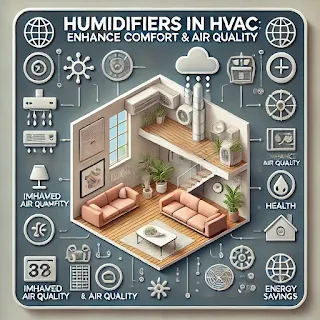The Role of Humidifiers in HVAC Systems: Enhancing Comfort and Air Quality
Introduction
When it comes to indoor comfort and air quality, the role of humidity is often overlooked. While HVAC systems are designed to control temperature, adding humidifiers to the setup can transform indoor environments by balancing moisture levels, which is essential in both commercial and residential settings. This blog explores why humidifiers are a vital part of modern HVAC systems, detailing their benefits, types, and importance in creating comfortable, healthy indoor spaces.
Why Humidity Matters in Indoor Spaces
Humidity plays a critical role in determining indoor comfort, health, and the integrity of the environment. Ideally, indoor humidity should be between 30-50%, a range that supports optimal comfort while minimizing the risk of issues like dry air, respiratory discomfort, and the proliferation of certain viruses and bacteria. HVAC systems equipped with humidifiers offer a way to manage indoor humidity levels more precisely, which is particularly valuable during colder months or in regions with dry climates.
Top Benefits of Humidifiers in HVAC Systems
Improved Air Quality and Comfort
Low humidity can cause respiratory discomfort, dry skin, and irritations in the eyes and throat. By maintaining a balanced level of moisture in the air, humidifiers reduce these issues, improving overall indoor comfort and well-being.Reduced Energy Consumption
Air with a higher moisture content feels warmer, allowing people to feel comfortable at lower temperatures. This can reduce the need for excessive heating, leading to energy savings over time, especially in large commercial spaces.Protection for Materials and Equipment
Low humidity levels can cause wood to crack, electronics to malfunction, and artwork to deteriorate. For facilities with sensitive materials or equipment, such as museums, libraries, or data centers, adding a humidifier to the HVAC system can provide necessary protection against dryness-related damage.Enhanced Health and Reduced Illness Spread
Properly humidified air can decrease the likelihood of viruses spreading, as many viruses thrive in dry environments. For hospitals, schools, and offices, maintaining ideal humidity with HVAC-integrated humidifiers can help reduce the spread of colds and flu.Static Electricity Control
Dry air increases the buildup of static electricity, which can be bothersome in homes and damaging to electronic equipment in commercial settings. By managing humidity, HVAC systems with humidifiers reduce static electricity issues.
Types of Humidifiers Used in HVAC Systems
Steam Humidifiers
Steam humidifiers work by heating water until it turns into steam, which is then distributed into the air. These humidifiers are highly effective and can be used in both residential and commercial HVAC systems to achieve precise humidity levels.Evaporative Humidifiers
These systems use a wick or filter that absorbs water, which then evaporates into the air as it passes through. Evaporative humidifiers are energy-efficient and ideal for spaces that need consistent humidity without additional heating.Ultrasonic Humidifiers
Using ultrasonic vibrations, these humidifiers produce a fine mist, which is released into the air to raise humidity levels. They are quiet and highly efficient, making them ideal for settings where noise control is important, such as offices and hospitals.Spray Humidifiers
Spray humidifiers use high-pressure nozzles to spray a fine mist of water into the air. They are common in industrial applications where a larger volume of air needs to be humidified quickly and evenly.
Applications of Humidifiers in HVAC Systems Across Industries
Healthcare Facilities: Hospitals and clinics rely on humidified air to support patient health and comfort, as well as to reduce the spread of airborne illnesses.
Museums and Libraries: The right humidity levels are essential to preserving valuable artifacts, documents, and artwork.
Manufacturing Plants: In industries where sensitive processes or materials are involved, humidity control ensures product quality and equipment performance.
Data Centers: Excessive dryness can lead to static discharge, which can damage servers and other electronic equipment. Humidifiers help maintain safe conditions in data centers.
Conclusion
Integrating humidifiers into HVAC systems offers significant benefits in comfort, energy savings, health, and equipment protection. Whether in homes, offices, healthcare facilities, or industrial settings, proper humidity control creates healthier and more comfortable environments. By adding a humidifier, HVAC systems can deliver not only temperature control but also a balanced indoor climate.
For more HVAC insights and services, check out our work at CFN-HVAC. If you're interested in optimizing humidity control in your HVAC system, don't hesitate to reach out for professional consulting.
Global HVAC Consulting Services
HVAC & Technical Books And Audiobooks


%20connected%20to%20a%20central%20AI%20hub%20displ.webp)

Comments
Post a Comment